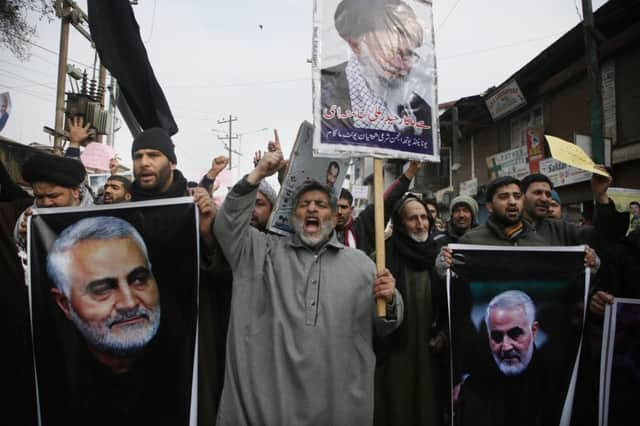UK braced for fall out as Iranians vow ‘severe revenge’ for drone killing


The Iranian government promised “severe revenge” for the killing of General Qassem Soleimani, who was targeted by a missile strike near Baghdad’s airport on Friday.
Gen Soleimani, the head of the elite Quds Force, was one of the most powerful figures in Iran and the architect of his country’s involvement in the proxy war in Syria.
Advertisement
Hide AdAdvertisement
Hide AdThe US Defence Department said it killed Soleimani because he “was actively developing plans to attack American diplomats and service members in Iraq and throughout the region”.
Allies including the UK are understood not to have been given advanced notice of the airstrike, and yesterday moved to harden defences around military bases in Iraq that are home to hundreds of troops.
Several western governments including the US advised their citizens to leave Baghdad “immediately”, although the Foreign Office has not updated its travel advice.
Foreign Secretary Dominic Raab called for a de-escalation of tensions, and spoke to US Secretary of State Mike Pompeo yesterday.
Mr Raab issued a statement saying the UK Government had “always recognised the aggressive threat posed by the Iranian Quds force” led by Gen Soleimani.
“Following his death, we urge all parties to de-escalate. Further conflict is in none of our interests,” Mr Raab added.
Mr Pompeo stressed that the White House “remains committed to de-escalation”.
But on Twitter, the US President did not tone down his rhetoric, posting a picture of an American flag followed by the message: “Iran never won a war, but never lost a negotiation!”
Advertisement
Hide AdAdvertisement
Hide AdPrime Minister Boris Johnson, who has been celebrating New Year on the private Caribbean island of Mustique, was yet to comment last night.
There are around 400 British troops deployed in Iraq as part of Operation Shader - the UK’s part of the international coalition fighting so-called Islamic State (IS).
Tory MP Tobias Ellwood, a former defence minister who served as a captain in the Army, warned on social media that western allies should “expect repercussions.”
Middle East experts also warned of retaliations following the US strike. Ian Bond, foreign policy director at the Centre for European Reform, called the air strike a “big escalation” by Mr Trump and a “a lawless step that increases risk to US and allies”.
And Seyyed Mohammad Marandi, the professor of North American Studies at the University of Tehran, said: “If I was a western citizen I would leave the UAE immediately. I would leave the whole region.”
Dr Jack Watling, research fellow at the Royal United Services Institute (RUSI), said the attack was “very significant” because it was an “assassination” outside a declared armed conflict.
But he said that Iran was not likely to want to provoke a war with the US.
Dr Watling added that “ultimately Iran does not want to provoke a full-scale conflict” but warned that if the UK was seen by Iran to be participating in US actions, it could capture or arrest British citizens in the region.
Advertisement
Hide AdAdvertisement
Hide Ad“The Iranians do not draw a direct line between the UK and US,” Dr Watling said. “Citizens in Iraq, Syria and Lebanon would certainly potentially be at risk, dual-nationalities in Iran will certainly be at risk of arrest under espionage charges.”
RUSI research fellow Michael Stephens warned the situation could grow into a wider regional conflict.
He added: “The US strikes in Iraq are a game changing event that will have severe repercussions for regional security.
“Iran will look to strike back at US interests across the region, as well as disrupt the activities of its allies.”